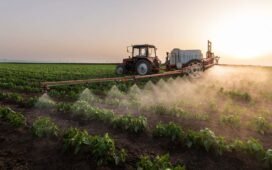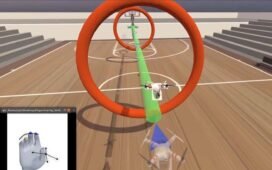
A Spot robot equipped with a blowtorch for tackling weeds
Dezhen Song et al. (2024)
A robot dog equipped with a blowtorch could be used to stop weeds growing on farms, potentially offering a replacement for harmful herbicides.
Even highly targeted herbicides can cause environmental problems, affecting local wildlife, and “superweeds” are quickly evolving resistance to the most common weed-killers like glyphosate.
In search of an alternative solution, Dezhen Song at Texas A&M University and his colleagues have developed a weed control system that uses a brief burst of heat from a propane-powered torch controlled by a robotic arm, attached to a Spot robot manufactured by Boston Dynamics.
Rather than incinerate the weeds, the robot is designed to identify and heat up the centre of the plant, which can stop it growing for several weeks, says Song. “The weeds don’t die – you just suppress their growth so it gives your crop a chance to fight the weed.”
Song and his team first tested the flame nozzle to make sure they could accurately target the weeds’ centre. Then they deployed the robot in a cotton field planted with weeds native to Texas, like common sunflower (Helianthus annuus) and giant ragweed (Ambrosia trifida). In five trials, they found that the robot could locate and torch the weeds with an average of 95 per cent of the flame focused on the weed.
One large limitation is the battery life of the Spot robot, which can only run for around 40 minutes in this setup before it needs to be charged, says Song, but the team is working on upgrading to a longer-lasting device. They are also looking at equipping the robot dog with an electrocution device capable of delivering more than 10,000 volts, which will stop weed growth for longer, he says.
“People have been using some forms of fairly broad, imprecise flames to kill weeds on other machines – that’s been around for a while, but I’ve never seen a precision thing like this,” says Simon Pearson at the University of Lincoln, UK. The success of the robot will depend on how accurately it can cast its flame and avoid damaging valuable crops, he says.
Article amended on 24 July 2024
The article was amended to more accurately describe the burning tool and the robot’s battery life.
Topics:








